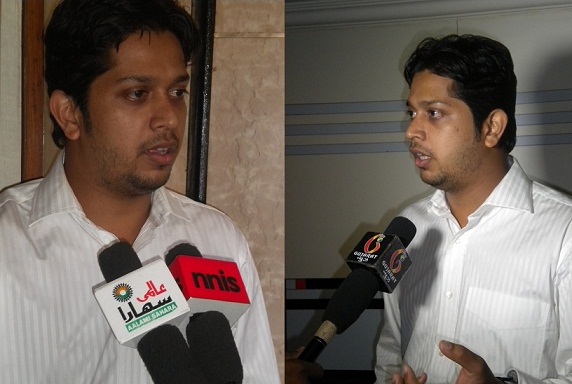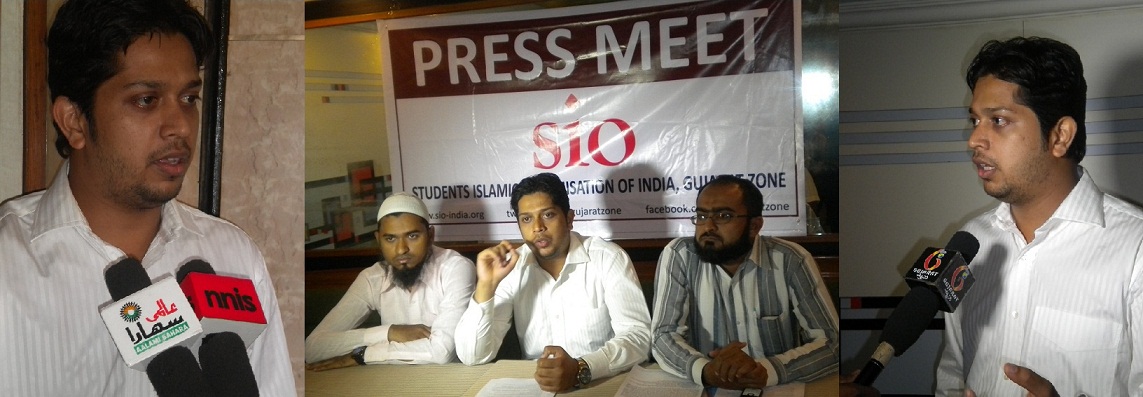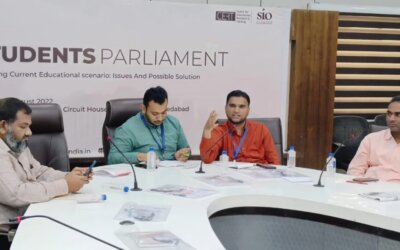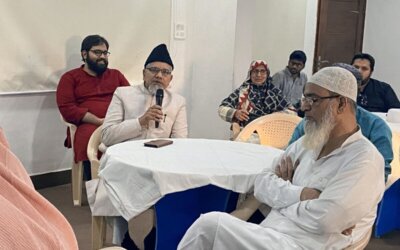National President of the Students Islamic Organization of India, Br.Ashfaq Ahmed Shareef addressed a Press conference in Gujarat on 12th April 13, 2013. He was on an organizational visit of Gujarat zone.
Addressing the press conference, he said that today’s educational system has become absolutely materialistic and career-oriented. He urged the student community to join hands with SIO in order to redefine the educational system. He also raised grave concerns on the decline of moral values in our society. Quoting the recent incident of Delhi Rape case, he said that when the entire nation was protesting against the rape and demanding justice for the victim, meanwhile, 50 molestation cases were registered in a day. He urged the students community to play active role in nation building.
SIO Gujarat Zonal secretary Dr. Farooque Ahmed added that there are more than 85% primary schools which are run by the Gujarat government, but on the other hand the percentage of secondary and higher secondary school is less than 5% in the state. He further added that due to the Commercialization of education in Gujarat, 3.1% of the children aged 6 to 14 years and 30.1% girls and 16.4% boys in the age 15 to 16 yrs don’t go to school. He also added that the development in Gujarat is confined to only big cities and people from rurals still live in pathetic situation. He also emphasized on the educational scenario of muslims and said that their condition is worse than SCs and STs.
SIO put forth the following demands:
- Commercialization of educational system should be stopped immediately.
- Backward classes should be included in the development programs on a large scale.
- Minority scholarship should be implemented immediately as per the verdict of the High court.
- All-round development of the riots-affected Muslims should be taken on priority.
- Special funds should be allocated in the budget for the development of Muslims.
- Strict implementation of ban on alcoholism.
- Learning outcomes of school education should be improved through reform in pedagogy and curriculum, teaching children through their learning abilities by professionally trained and motivated teachers.
- Inculcation of moral values in curriculum is extremely important as also suggested by various academicians.
- Biased information in history text books must be taken into account as it results in knowledge deficit.
- National Education framework must be constructed on the idea of India’s pluralistic society not on biased mindsets.
- Government must make sure that Indian campuses reflect democratic environment and restrict all kind of unethical, immoral and hatred conducts from both management and students side.
Issues to be addressed for overall education in India:
1. Quality teacher recruitment is the biggest challenge in schools, as to fulfill RTE norms, an approx of 30 lakhs quality teachers are required. There are about 1.29 million elementary schools in the country. Besides funding, shortage of teachers is a crucial hurdle to implementing the Act. According to the ministry, 43% of government schools have a pupil-teacher ratio of more than 30:1. About 9% schools are run by single teachers, while 20% have teachers without professional qualifications. There is an estimated shortage of 12 lakh teachers.
2. Dropout rate of students goes to 6.8% and is fluctuating around the years, constant education policy initiatives must be taken immediately, to make sure higher enrollment and less dropouts like infrastructure development, regular follow up of students at elementary level etc
3. Commercialization of education in the metros is a serious concern; this diminishes the healthy competition among students which is threatening for a balanced growth of nation. Private institutions are way ahead in imparting quality education, report ASER said that nearly 40 million students will be affected if the situation of government schools are not controlled.






0 Comments